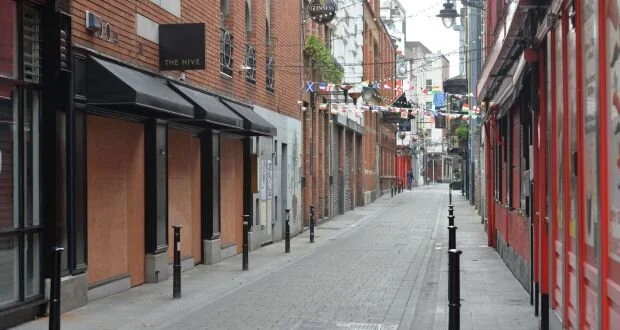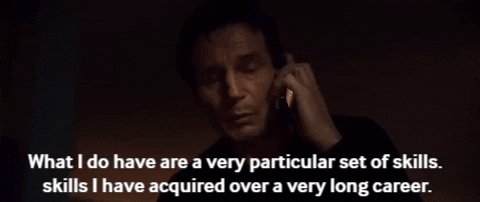The Backward Approach to Moving Forward (Part 1)
/“If you don’t know what you do want, maybe start by figuring out what you don’t want.”
That piece of advice is one that my mom has given me since I was a young girl, when I was consistently plagued with intense indecisiveness for fear of making a wrong decision. It’s something I’ve carried with me into adulthood; I am still occasionally plagued with indecision, albeit less intensely (most of the time anyway). It’s a “process of elimination” approach, just a little backward, I guess.
Usually, my indecision relates to simple things like what to order from a restaurant, or what to watch on Netflix. Lately, I’ve been feeling it in a much bigger way in relation to work.
Let me give an abbreviated backstory of what led me to reach this crossroad of sorts:
About a year and a half ago, I left my friends, family, apartment, and two jobs to move to Ireland and marry my husband, an Irish national. It’s something I’d known I would probably do for the majority of our two-and-a-half-year long-distance relationship, and in the fall of 2019, it happened. I moved overseas, got married 2 weeks later, and celebrated the holidays for the first time without my New York family.
Everything was great until January 2020 rolled around and real-life became, well, real. My marriage has truly been amazing from the get-go; I’m really thankful for that piece of my life staying so solid! But everything else? Not quite.
“I tried as hard as I could to hold on to
the little bits of myself that remained intact
as everything else around me and inside me
felt like it was falling apart.”
The plans I had in mind, the adventures I wanted to go on, the social outlets I planned to join were all eliminated when COVID reared its ugly head just a few months into last year. I was left feeling a myriad of things: frustration, fear, and anxiety to name a few, as well as a significant increase in mental health issues. I had what I would consider my first real brush with depression and decided to start therapy sessions online. I tried as hard as I could to hold on to the little bits of myself that remained intact as everything else around me and inside me felt like it was falling apart.
It was a hard year (not just for me, I know, 2020 was extremely hard for many people); for me, the hardship of the pandemic was amplified by the fact that I was in a completely new place with almost nothing comforting or familiar to hold onto, all while experiencing the chaos that came with the world shutting down. My family, friends, bedroom, car, jobs, favorite grocery stores, local karaoke spots, nature walks, gym—they were all distant memories.
via irishtimes.com
I wasn’t yet allowed to drive the car I naively bought myself in January. I moved into an apartment that was a 30+ minute walk from civilization. I didn’t want to use public transportation—partly due to my own anxiety, but also, COVID. There were no gyms to join. There were no singing groups to audition for. I felt like I had nothing.
I spent the majority of 2020 trying to get a handle on myself, my emotions, and my mental health. Lucky for me, there was not much else to do, so I could really focus (though sometimes, way too deeply) on feeling better. I felt like I had to re-learn my own self. It was like my personal identity had become so warped from all the changes I had gone through that I needed a reintroduction to myself.
What a strange feeling that is, getting to know yourself again. But more than that, I had to first figure out who it was that I was trying to get to know:
Who was I in this new country?
Who was I in this new role of wife?
Who was I without my friends and family a short drive away?
Who was I with no job or colleagues?
Who was I in this new headspace?
Who was I?
It felt like the Elena I knew was gone, and that all the things that had shaped my identity had disappeared too, or had at least become very distant.
Over time, the discomfort I initially felt being “stuck” in our apartment turned into an unhealthy over-comfort with isolating and avoiding the outside world, a world which grew increasingly scarier as COVID and my mental health issues progressed. I was angry that I couldn’t go anywhere, but also very grateful, because going anywhere or doing much of anything, really, was too overwhelming on most days. What a difference from the “me” that had worked 2 jobs, saw my friends and family on a weekly basis, was comfortable with going places alone and enjoying my own company, and felt overall fulfilled with the plentiful life I had created.
“Having the freedom and capacity to do something
as simple as grocery shopping on my own felt like the most rewarding opportunity I’d ever had.”
One of the few things I enjoyed in 2020 was being a wife. I took this role very seriously as it was the only piece of my identity that felt tangible in the here-and-now every day. I was determined to be the best partner and support system for my husband that I possibly could be, even amidst my own intense internal struggles.
By early fall, I started to feel more human, less detached from myself, and more independent again. I was starting to feel some significant positive effects from therapy, and I had hope that I would one day be okay again, and at some point, happy. Not only had I mastered navigating the bus system to get to a few important locations, but I’d also finally gotten my Irish driver’s license and was free to adventure to any grocery store that my heart desired within a 5-kilometer radius of our apartment. Having the freedom and capacity to do something as simple as grocery shopping on my own felt like the most rewarding opportunity I’d ever had.
By the end of 2020, I had finally secured a job for the new year and was actually feeling very ready to get back to work. I landed myself a job that was aligned with something I’d talked about for years: working with adults with Autism in a day service. I had always wondered if this population was one that I could do some great work with. It would be a great challenge, but one that I thought I could thrive in. I was so excited.
I’m now several months into the job, and throughout my time working at this facility, I’ve had some minor personal crises in relation to a very big question: Can I see myself doing a job like this long-term?
By profession, I am a Creative Arts Therapist. I enjoy doing Creative Arts Therapy. I enjoy working with people with mental health and intellectual disabilities. But I’ve also struggled in the past with wondering how emotionally and mentally capable I am of working in intense therapeutic settings, or with populations of people prone to intense behaviors. Within the first 2 months of this job, those questions I’d had in the past started to resurface and morph into new levels of doubt:
Could I handle working with people that had the propensity for anger, aggression, or outbursts?
Could I handle a job where a vulnerable person’s mental and emotional well-being is in my hands, whether for a one-hour therapy session or an entire day?
Could I handle working in the mental health field?
There’s a lot of pressure and responsibility that comes with working in therapeutic settings, and I’m finding lately that for me, there is a lot of anxiety that comes with that. There is a fear response that comes out in me when I’m responsible for shaping, holding, containing, and guiding a person’s mental and emotional space in an intensive therapeutic environment. I’m not sure if it stems from self-doubt or actual fear, but either way, my physiological response can be stifling.
I do believe that I have a particular set of skills that can foster impactful and important experiences for people. I get great fulfillment in knowing that I’ve “held the space” for someone; in other words, creating a judgment-free mental, emotional, physical, and sometimes intellectual, creative space where people can explore their thoughts and feelings, get things off their chest, and work towards a sort of catharsis. There is a great level of trust that comes with holding the space for someone, and for me, it’s one of the most rewarding skills that I possess.
It’s important to me that I get the opportunity to feel fulfilled in this way and know that I’ve made an impact on someone, both personally and professionally. Maybe that’s the performer in me, wanting to tap into people’s emotions through music. Maybe that’s the art therapist in me, wanting to tap into people’s emotions through art. Or maybe that’s just me, wanting to tap into people’s emotions through any means possible.
There is no question that I value my ability to do this for, and with people. What I do question, however, is whether doing this in therapeutic settings might be too much for me to handle. What if working in any clinical therapeutic environment with vulnerable clients is too much for me to handle?
Contemplating the career field that took me 3 years to find, 2.5 years to study, and 1.5 years to become certified in is, to say the least, terrifying. It has sent me down a deep dive of doubt and curiosity which has led me to one enormous question: What do I really want in life?
Perhaps the most proverbial question that anyone can ever ask themselves, I’ve now started to ask myself. Maybe my 30’s have brought me into an existential crisis. Maybe, after a year of rebuilding myself after hitting my rock bottom, I’m now feeling stronger and in tune enough with myself to start getting to the root of what it is that I really want.
Recognizing these desires has been tough lately, but I do know one thing: I want to be a person that can hold the space for someone, that can be part of an emotional experience. Whether they are feelings of joy, sadness, frustration, determination, anger, hope, peace, or anything in between, I want to facilitate a personal exploration of emotions for anyone and everyone who may need it.
The approach of figuring out what I don’t want has actually served me well in the past; it has become a sort of “process of elimination” approach. While this might seem like I’m “focusing on the negative,” it often results in the exact opposite: a very positive and insightful outcome. I think for a lot of people, it can be easier to identify the things that are “wrong” in a situation; they’re usually the things that elicit a stronger response.
So, if the things you don’t want or like are more obvious, why not use that to your advantage to figure out what you do want?…
Stay tuned for Part 2, where we explore the “backwards” process of using what we don’t want to learn more about what we do want.
Share your comments at the bottom of the page.
© Whatismyhealth
















“If you don’t know what you do want, maybe start by figuring out what you don’t want.”